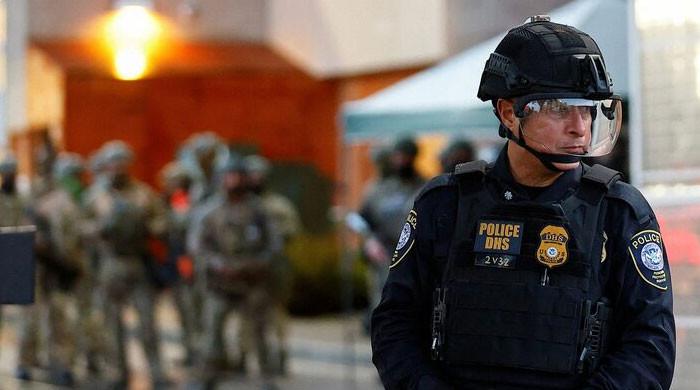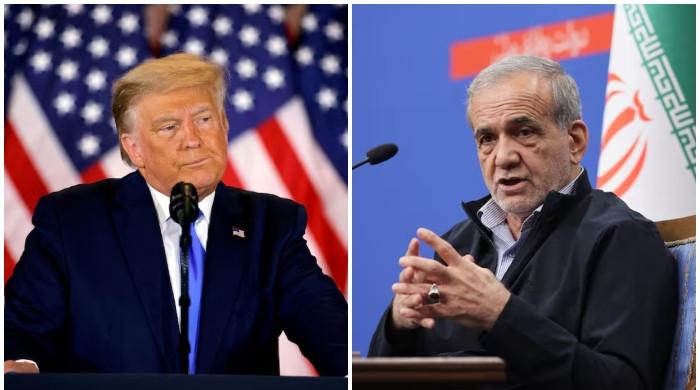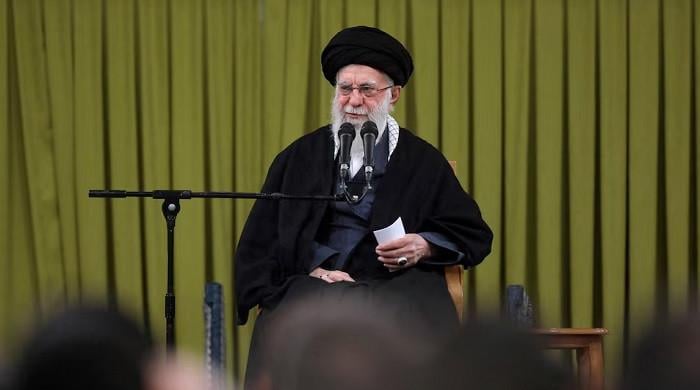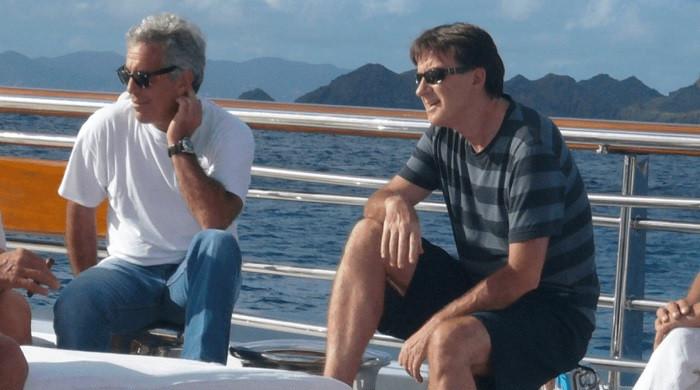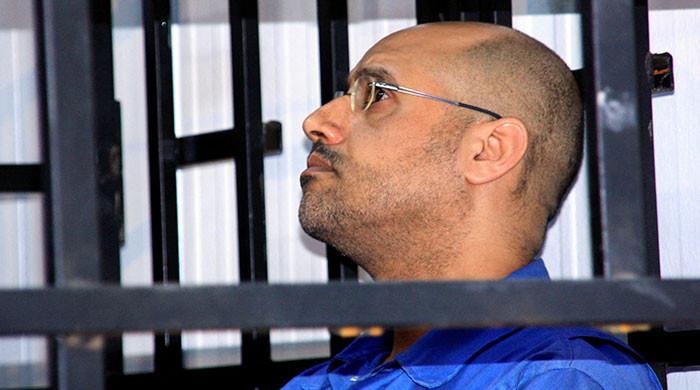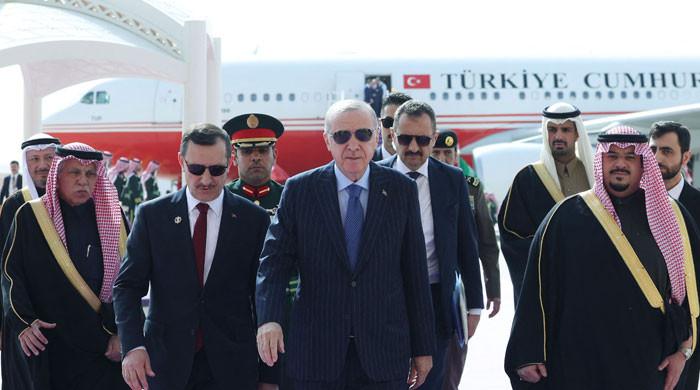UK PM Cameron to resign amid growing fears of Brexit fallout
"I do not think it would be right for me to be the captain that steers our country to its next destination," he said
June 24, 2016
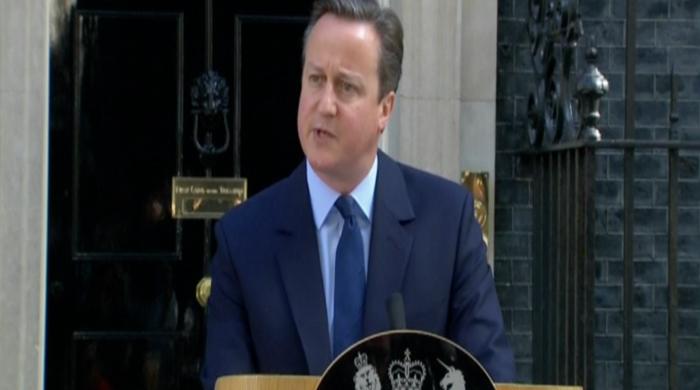
LONDON: Britain's David Cameron said he would resign as prime minister by October after Britons voted in a referendum to leave the European Union.
"I do not think it would be right for me to be the captain that steers our country to its next destination," he told reporters outside his Downing Street office.
Cameron, who choked back tears, gave no detailed timetable but said there should be a new leader by the time his Conservative Party holds its annual conference in October.
"This is not a decision I've taken lightly but I do believe it is in the national interest to have a period of stability and then the new leadership required," he said.
"I think it's right that this new Prime Minister takes the decision about when to trigger article 50 and start the process of leaving the EU."
Voters in Britain decided 51.9 percent to 48.1 percent in favour of quitting the bloc, final results showed.

Leader of the United Kingdom Independence Party (UKIP), Nigel Farage (C) reacts outside the Leave.EU referendum party at Millbank Tower in central London- AFP
Eurosceptics cry victory
Eurosceptics cried victory early Friday after Britain voted to leave the EU, demanding referendums in their own countries and sharpening concerns about the future of European unity.
"Victory for Freedom! As I have been asking for years, we must now have the same referendum in France and EU countries," French far-right leader Marine Le Pen wrote on Twitter shortly after the results were announced.
In the Netherlands -- like France, one of the six founding members of the European community -- anti-Islam and anti-immigrant MP Geert Wilders also congratulated Britons on their "Independence Day."
"The Dutch people deserve a referendum as well. The Party for Freedom consequently demands a referendum on NExit, a Dutch EU exit," Wilders said in a statement.
There are growing fears the British vote could trigger a domino effect, threatening the core of the European project.
EU President Donald Tusk said the bloc was "determined to keep our unity."
And EU Parliament President Martin Schulz said Friday he would speak with German Chancellor Angela Merkel "on how we can avoid a chain reaction" of other EU states following.
But he voiced confidence there would be no contagion.
The EU was the biggest single market in the world and "Great Britain has just cut its ties with that market," Schulz said.
"That'll have consequences and I don't believe other countries will be encouraged to follow that dangerous path."
But Matteo Salvini, Italy's most prominent far-right politician, also hailed the Brexit vote as an example his country should follow.
There were similar reactions from other European eurosceptic parties.

Pedestians walk past an electronic stock indicator of the London stock exchange (FT100) in the window of a securities company in Tokyo on June 24, 2016- AFP
World stocks in freefall
Carnage came to global markets on Friday as results of an historic referendum showed Britain had voted to leave the European Union, sending sterling on a record plunge and pummelling equities across the world.
Such a body blow to global confidence could well prevent the Federal Reserve from raising interest rates as planned this year, and might even provoke a new round of emergency policy easing from all the major central banks.
Risk assets were scorched as investors fled to the traditional safe-harbors of top-rated government debt, Japanese yen and gold.
Billions were wiped from share values as FTSE futures fell 7 percent FFIc1, EMINI S&P 500 futures ESc1 5 percent and Japan's Nikkei .N225 7.6 percent. European stock markets were set to up 6-7.5 percent lower.
The British pound collapsed no less than 18 US cents, easily the biggest fall in living memory, to hit its lowest since 1985. The euro in turn slid 3.1 percent to $1.1022 EUR= as investors feared for its very future.
Nearly complete results showed a 51.8/48.2 percent split for leaving, setting the UK on an uncertain path and dealing the largest setback to European efforts to forge greater unity since World War Two.
Sterling sank a staggering 10.1 percent to $1.3387 GBP=, having carved out a range of $1.3228 to $1.5022. The fall was even larger than during the global financial crisis and the currency was moving two or three cents in the blink of an eye.
"It's back to the future, we're back to where we were in 1985," said Nick Parsons, co-head of global currency strategy at NAB in London.
"We've had a 10 percent decline in six hours. That's simply extraordinary, and a vote to leave provides an existential crisis for Europe."
The shockwaves affected all asset classes and regions.
Gold rallied the most since the 2008 global financial crisis and oil and copper tumbled on Friday.
Other currencies across Asia suffered badly on worries that alarmed investors could pull funds out of emerging markets.
MSCI's broadest index of Asia-Pacific shares outside Japan slid almost 5 percent, while Shanghai stocks lost 1.1 percent.
Financial markets have been racked for months by worries about what Brexit, or a British exit from the European Union, would mean for Europe´s stability.
Torn apart
Britain, which joined the then European Economic Community (EEC) in 1973, has always been an ambivalent member. A firm supporter of free trade, tearing down internal economic barriers and expanding the EU to take in ex-communist eastern states, it opted out of joining the euro single currency or the Schengen border-free zone.
Cameron’s ruling Conservatives in particular have risked being torn apart by a slow by steady rise in euroscepticism ever since differences over Europe triggered the ousting of former Prime Minister Margaret Thatcher in 1990.





